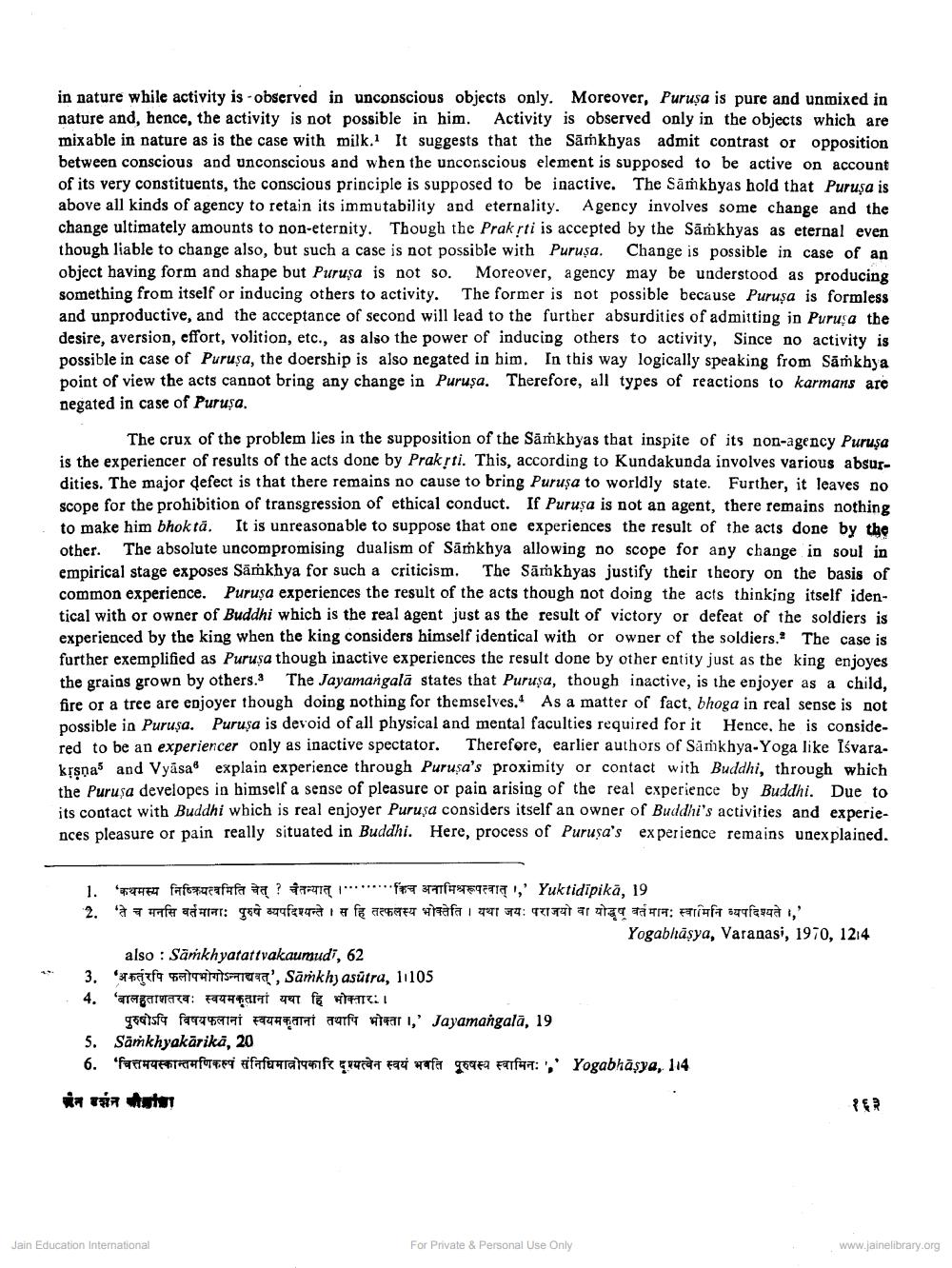________________
in nature while activity is observed in unconscious objects only. Moreover, Purușa is pure and unmixed in nature and, hence, the activity is not possible in him. Activity is observed only in the objects which are mixable in nature as is the case with milk. It suggests that the Samkhyas admit contrast or opposition between conscious and unconscious and when the unconscious element is supposed to be active on account of its very constituents, the conscious principle is supposed to be inactive. The Samkhyas hold that Puruşa is above all kinds of agency to retain its immutability and eternality. Agency involves some change and the change ultimately amounts to non-eternity. Though the Prakṛti is accepted by the Samkhyas as eternal even though liable to change also, but such a case is not possible with Purușa. Change is possible in case of an object having form and shape but Puruşa is not so. Moreover, agency may be understood as producing something from itself or inducing others to activity. The former is not possible because Puruşa is formless and unproductive, and the acceptance of second will lead to the further absurdities of admitting in Purusa the desire, aversion, effort, volition, etc., as also the power of inducing others to activity, Since no activity is possible in case of Puruşa, the doership is also negated in him. In this way logically speaking from Saṁkhya point of view the acts cannot bring any change in Purușa. Therefore, all types of reactions to karmans are negated in case of Purușa.
The crux of the problem lies in the supposition of the Samkhyas that inspite of its non-agency Puruşa is the experiencer of results of the acts done by Prakṛti. This, according to Kundakunda involves various absurdities. The major defect is that there remains no cause to bring Purusa to worldly state. Further, it leaves no scope for the prohibition of transgression of ethical conduct. If Purușa is not an agent, there remains nothing to make him bhok tā. It is unreasonable to suppose that one experiences the result of the acts done by the other. The absolute uncompromising dualism of Samkhya allowing no scope for any change in soul in empirical stage exposes Samkhya for such a criticism. The Samkhyas justify their theory on the basis of common experience. Puruşa experiences the result of the acts though not doing the acts thinking itself identical with or owner of Buddhi which is the real agent just as the result of victory or defeat of the soldiers is experienced by the king when the king considers himself identical with or owner of the soldiers. The case is further exemplified as Purușa though inactive experiences the result done by other entity just as the king enjoyes the grains grown by others.3 The Jayamangala states that Puruşa, though inactive, is the enjoyer as a child, fire or a tree are enjoyer though doing nothing for themselves. As a matter of fact, bhoga in real sense is not possible in Purușa. Purușa is devoid of all physical and mental faculties required for it Hence, he is considered to be an experiencer only as inactive spectator. Therefore, earlier authors of Samkhya-Yoga like Iśvarakṛṣṇa and Vyasa explain experience through Purusa's proximity or contact with Buddhi, through which the Purușa developes in himself a sense of pleasure or pain arising of the real experience by Buddhi. Due to its contact with Buddhi which is real enjoyer Puruşa considers itself an owner of Buddhi's activities and experiences pleasure or pain really situated in Buddhi. Here, process of Purusa's experience remains unexplained.
1. 'कथमस्य निष्क्रियत्वमिति चेत् ? चैतन्यात् । ....... 'किच अनामिश्ररूपत्वात्, Yuktidipikā, 19
2. 'ते च मनसि वर्तमानाः पुरुषे व्यपदिश्यन्ते । स हि तत्फलस्य भोक्तेति । यथा जयः पराजयो वा योद्धृषु वर्तमानः स्वामिनि व्यपदिश्यते । '
Yogablasya, Varanasi, 1970, 12:4
also: Sämkhyatattvakaumudi, 62
3. 'अकर्तुरपि फलोपभोगोऽन्नाद्यवत्', Sāmkhy asūtra, 11105
4.
'बाल हुताशतरवः स्वयमकृतानां यथा हि भोक्तारः ।
पुरुषोऽपि विषयफलानां स्वयमकृतानां तथापि भोक्ता ।' Jayamangalā, 19
5. Sämkhyakärikā, 20
6. 'चित्तमयस्कान्तमणिकल्पं संनिधिमात्रोपकारि दृश्यत्वेन स्वयं भवति पुरुषस्य स्वामिनः Yogabhāsya, 114
नवना
Jain Education International
For Private & Personal Use Only
१६३
www.jainelibrary.org




